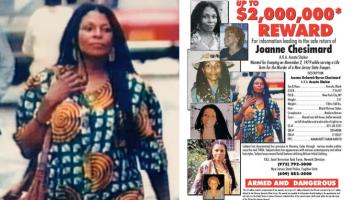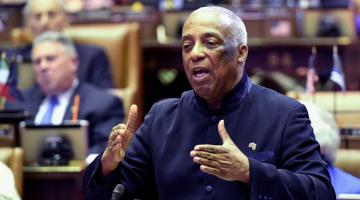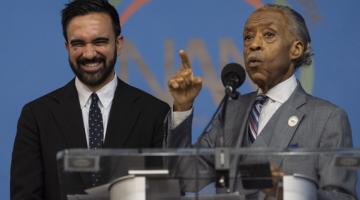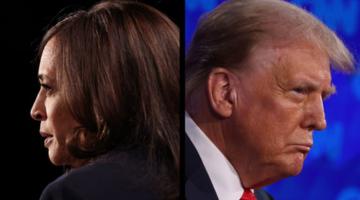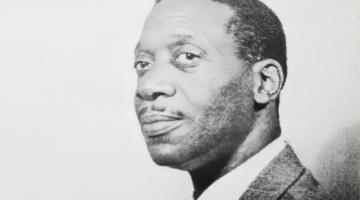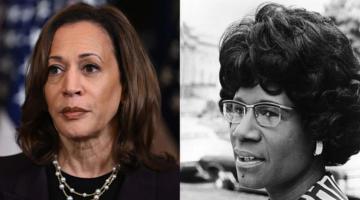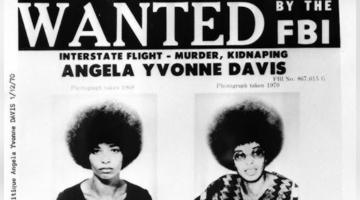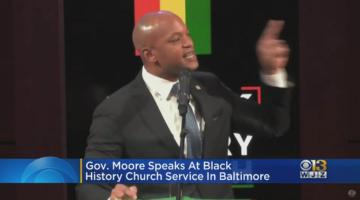Barack Obama speaks to a group of Black men before a rally in support of VP Kamala Harris in Pittsburgh, Pennsylvania on Oct. 10, 2024. Photo: REUTERS"
For decades, the Democratic Party has pushed Black men as the scapegoat for election losses. Every cycle, they put forth a different excuse for why this demographic is unique in its political beliefs and attitudes toward voting. This time, they trotted out the misleader-in-chief, Barack Obama to scold Black men and lob accusations of misogyny rather than engage with legitimate political grievances.
On the evening of August 11, 1998, Dr. Daniel Picus returned to his home in the St. Louis suburb of University City after finishing his shift at Barnes-Jewish Hospital in the city. Walking up the stairs from the garage he immediately noticed something wrong: the back door was open, which was unusual. He and his wife, Felicia Gayle, kept their doors closed and locked as a matter of routine.
Walking inside, he noticed that the kitchen was a “mess:” the freezer door was ajar, and appeared to have been rummaged through; one of the kitchen drawers was also open and a cardboard knife sheath was strewn across the floor. His sense of dread growing, Dr. Picus called out for his wife and failing to get a response, he continued through the kitchen and into the front hall where he discovered his wife’s body, lying in a pool of blood on the floor. But for a purple shirt, she was nude, a kitchen knife lodged in her neck.
She had been stabbed 43 times.
If there was any good news it was that her killer left behind a ton of forensic evidence. Police found bloody shoeprints near the knife cover in the kitchen, in the hallway leading to the front foyer, and on the rug near the corpse. Technicians collected bloody fingerprints from the stairwell and a wall near Ms. Gayle’s body and in the upstairs bedroom, as well as hairs from Ms. Gayle’s t-shirt, her hands, and on the carpet near where her body was found. The only items missing from the home were Ms. Gayle’s purse and an Apple laptop.
Despite the mountain of evidence, and extensive media coverage, ten months passed without a break in the case. It was only after Dr. Picus offered a $10,000 reward for information leading to a conviction that witnesses stepped forward in June of 1999, when Henry Cole, a career criminal, told homicide investigators that he had been locked up for two months at a county workhouse with another inmate named Marcellus Williams. Cole told police that Williams, who was locked up for the armed robbery of a donut shop, had confessed to him that he had killed Gayle when she interrupted him while burglarizing her home.
Cole was hardly a perfect witness, however. Addicted to crack cocaine and heroin, Cole also suffered from mental illness and had been prescribed psychotropic medicine that caused hallucinations and memory loss. Moreover, he made it clear that he was far more interested in the reward money than he was justice. When told by police that he could only collect the reward after a conviction, he blurted out:
“Ain’t no way I can get any kind of money at all upfront?”
He was also hoping to leverage information about Gayle’s killing to avoid a lengthy prison sentence for violating his probation multiple times. Recently diagnosed with HIV, he wrote to prosecutors in February 1999, appealing for leniency:
[I]f I go to prison I will surly [sic] die.”
Cole claimed that no one else in the crowded lockup had heard Williams confess and that he’d told him that the only other person he had admitted the murder to was his girlfriend, Laura Asaro, a sex worker who was dealing with her own legal troubles. When she’s been arrested for prostitution on September 1, 1998—about a month after Gayle’s murder-- Asaro told officers that she had information related to “the murder of the woman in University City, but when detectives tried to question her, she refused to talk to them, saying that she was “just trying to get out of the arrest.”
After Cole implicated Williams however, police enlisted Cole as an informant but over a period of four months, he failed to cull from Asaro any statements incriminating Cole. It was only when detectives approached Asaro a second time in November of 1999 and threatened her with arrest on outstanding warrants that she implicated Williams who she’d been dating for two or three months before he was arrested for the doughnut shop robbery.
Asaro told police that on the day of the murder, Williams was wearing a jacket zipped to the top even in the August heat. She said that he also had a laptop-- which he sold to her ex-boyfriend, Glenn Roberts, for $150 or $250—a woman’s purse in the trunk of his car, and scratches on his neck. Suspecting him of seeing another woman, Asaro said that she confronted Williams, who then confessed to her that he had murdered Gayle. Police arrested Williams on November 29, 1999, 15 months after Gayle’s murder.
The case against him though was hardly a slam dunk. For starters, there was no forensic evidence linking him to the crime scene: his DNA was excluded as the source of the genetic materials collected from the murder weapon, nor was he a match for the bloody shoeprints, fingerprints or hairs found near Gayle’s body.
Then there were discrepancies in both Cole and Asaro’s accounts of the murder; Cole, for instance, said that Williams told him he had worn gloves yet there were fingerprints found throughout the home that Gayle shared with Dr. Picus. And, when he was questioned by police, Roberts, who acted as the fence, said that Williams told him that Asaro had given him the laptop to sell, implicating Asaro, not Williams.
At trial, prosecutors moved to exclude Roberts’ testimony implicating Asaro; a jury of 11 whites and one African American convicted Williams of Gayle’s murder in 2001.
The white St. Louis County prosecutor who tried the case, Bob McCulloch, would later refuse to indict the white Ferguson police officer, Darren Wilson, who fatally shot an African American teenager, Michael Brown, in August of 2014. That, and his defense of police brutality over a 27-year-career would cause voters to replace him with Wesley Bell, an African American reform candidate, in the 2018 election. In January of this year, Bell’s office filed a motion to vacate Williams’ murder conviction, arguing that the lack of evidence, unreliable witnesses and prosecutorial misconduct cast “inexorable doubt on Mr. Williams’s conviction and sentence.”
State officials upheld the verdict and on September 25, executed Williams by lethal injection. He was 55.
His ordeal seemed drawn from a John Grisham novel, or a tattered script that had been bandied about Hollywood studios for years but rejected because it was too outrageous to believe. Said Bell after the execution:
“Marcellus Williams should be alive today. If there is even the shadow of a doubt of innocence, the death penalty should never be an option. This outcome did not serve the interests of justice.”
Williams’ execution is also exhibit A in the people’s case against Democratic party power brokers like former President Barack Obama, who suggested last week during a campaign stop in Pittsburgh that misogyny explains why African American men are not as enthusiastic about Vice-President Kamala Harris’ White House bid as they were for his in 2008 and 2012.
“You’re coming up with all kinds of reasons and excuses,” Mr. Obama said, addressing African American men. “I’ve got a problem with that. “Part of it makes me think that, well, you just aren’t feeling the idea of having a woman as president, and you’re coming up with other alternatives and other reasons for that,” he said, adding that the “women in our lives have been getting our backs this entire time.
“When we get in trouble and the system isn’t working for us, they’re the ones out there marching and protesting.”
On social media platforms, and in barber shops, beauty salons and barrooms, African Americans took issue with Obama’s remarks, attributing Black men’s lack of enthusiasm to Obama and Harris’ failure to address injustices such as that experienced by Williams, or Brown before him. Since George Floyd’s 2020 lynching, police across the U.S. have slain more than 1,000 African Americans—the vast majority Black men—and the Biden administration has failed to pass any meaningful legislation to discourage police violence.
Similarly, while the White House held no sway over Williams’ prosecution by the state of Missouri, couldn’t Harris have used her bully pulpit to urge a new trial for Williams?
“I don’t think patriarchy or misogyny is why we are more open to sitting on the couch in this election,” Desjon Yisrael, an African American activist and researcher in North Carolina told Black Agenda Report in an interview. “We are tired of the Democrats pandering to us for the past 60 years.”
Dating back to the Jim Crow era when politicians manufactured serial Black rapists to foment violence against Black voters, “there has been an agenda to put down the Black man to make us the poster child and emblem of every social and economic problem in this country,” said Yisrael, whose Facebook profile is a photograph of Williams.
But beginning with the Reagan era, the duopoly has doubled down in its attempts to portray Black men as menacing to the civic project. In George Bush’s 1988 presidential bid, his campaign advisor Lee Atwater broadcast ads denouncing the Democrat’s presidential nominee, Michael Dukakis, as a liberal responsible for a Black convict named Willie Horton who raped and murdered a white woman while on parole. To counter the strategy, the Clinton administration passed the 1994 omnibus crime bill targeting African American offenders.
Stiffer criminal penalties have combined with a post-industrial economy and banking practices to destabilize African American communities, resulting in the worst hard time for Black men especially.
“Police,” Yisrael said, “continue to use Black men for target practice.”
Continuing he said:
“The Democrats don’t have an agenda for Black people. Why not? (Green Party presidential nominee) Jill Stein does. She has plans for dealing with cop cities, ending food deserts, reparations. Kamala has admitted publicly that she will not do anything that will benefit the Black community specifically.”
“Obama and others are really trying to make this into a gender thing, to deflect from the fact that the Biden/ Harris administration really hasn’t delivered. She wants to continue to supply Israel with weapons to continue the genocide in Gaza.”
He paused, then completed the thought:
“Black men aren’t going to turn out to vote for Kamala in big numbers because she is really Obama 2.0, not because she is a woman.”
Jon Jeter is a former foreign correspondent for the Washington Post, Jon Jeter is the author of Flat Broke in the Free Market: How Globalization Fleeced Working People and the co-author of A Day Late and a Dollar Short: Dark Days and Bright Nights in Obama's Postracial America. His work can be found on Patreon as well as Black Republic Media.

